
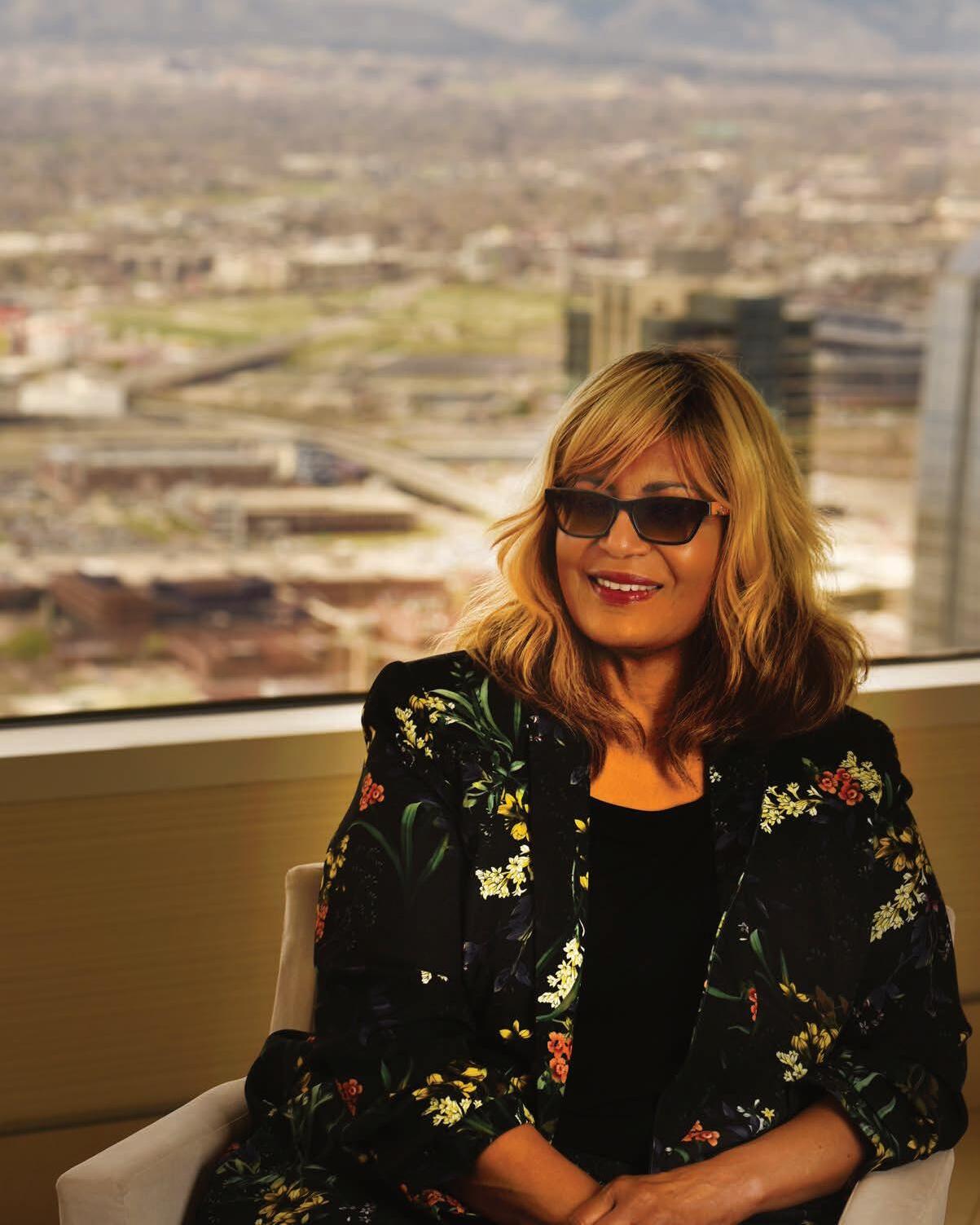
Acknowledging Missing and Murdered Indigenous People on May 5…10
Remembering Harlem's Black Ballerinas…13
Celebrating AANHPI Month with Understanding & Awareness…16
Prince Dykes & Terrell Davis Teach Wesley About Real Estate.…18
Dawn Bookhardt: Denver's Altruistic Attorney, Mothering A Community …4
Photo by Bernard Grant
Volume 38 Number 2 May 2024


You’ve made memories here. Your dreams started here. Whether it’s a wedding, unforgettable family vacation, kitchen remodel or college education, we’re here to help you realize your next dream. Get a home equity loan or line of credit with flexible financing and local processing.

BrianaFernandezLuna@alpinebank.com

TimothyFloyd@alpinebank.com
Equal Housing Lender NMLS#414674 • alpinebank.com • Member FDIC
Briana Fernandez Luna Vice President - Aurora Loan Production Office Aurora NMLS#1552486 720-697-5084
2340 Dayton Street Aurora, CO 80010
Timothy Floyd VP - Community Development Lending Mortgage NMLS#413950 720-683-7629
1743 Wazee Street, Suite 100 Denver, CO 80202

MESSAGE FROM THE EDITOR
In honor of Mother’s Day, the May issue of Denver Urban Spectrum is filled with inspiration and empowerment. This issue also recognizes the unique challenges, experiences and journeys of Indigenous Americans and Colorado newcomers.
Our cover story features a phenomenal professional and philanthropist, Dawn Bookhardt, who has dedicated her time and resources to the advancement of Denver communities for decades as one of the top attorneys in the state. We also pay tribute to Willie Mae Brown, a centenarian with over 100 years of commitment to her faith, family and community.
The Black Resilience in Colorado Fund will celebrate art and activism this month, with a conversation around the book, “The Swans of Harlem,” which details the history of five pioneering Black ballerinas in Harlem. Dance legends Karlya Shelton-Benjamin and Cleo Parker Robinson will be featured at this event in addition to Cleo Parker Robinson Dance’s Spring Concert, which heralds Mother’s Day and the exciting future of the company's historic dance theater.
This month provides an opportunity to honor diversity, which strengthens the human experience and connects us all.
In honor of the May 5 National Day of Awareness for Missing and Murdered Indigenous Women and Girls, writers Mona Cedilla and Christen Aldridge share the experiences of local individuals working to bring awareness to a growing crisis.
In honor of Asian American, Native Hawaiian and Other Pacific Islanders (AANHPI) Month, writer Melovy Melvin reflects on the experiences of AANHPI immigrants as they navigate life in Colorado.
This issue contains something for everyone, with letters about health legislation, racial equity legislation and other pressing issues taking place in Colorado and throughout the country. We’ve included celebratory articles honoring Chauncey Billups’ Hall of Fame induction, as well as investment analyst Prince Dykes and former Denver Broncos’ Terrell Davis for their latest collaborative literary project.
Thank you for your continued support of our community reporting. Have a safe and happy spring!
Ruby Jones DUS Editor
An Evaluation of Racial Equity in Colorado
We must take action now to better understand our past and build a better future
An Op-Ed by Senator James Coleman, Representative Leslie Herod, and Representative Naquetta Ricks

The State of Colorado has a rich and storied history in its nearly 150 years as a state. Coloradans are – rightly – very proud to call our majestic state home. Every day we feel honored to represent the innovative, diverse, inclusive and forward-thinking people of our districts.
However, not all Coloradans have had the same experiences throughout our state’s history –particularly Black Coloradans.
Though Colorado was not a slave state, slavery was only fully abolished in the Colorado State Constitution in 2018. There is also a tragically deep history of prejudice and discrimination in our state. From the prevalence and strength of the Ku Klux Klan at all levels of government (a former mayor of Denver being a member as recently as 1947) to the
LETTERS, OPEDS, OPINIONS


“Sundown Towns” that dotted the state’s terrain, where Black Coloradans were not welcomed and even faced violence. Our state has much to reckon with. In fact, as recently as April 2024, a sitting lawmaker refused to vote for a resolution in honor of Black History Month.
We believe it’s time that we work to understand Colorado’s history of racial inequity and prejudice, and evaluate the ways in which it continues to reverberate into the present; specifically, the impacts it has had on Black Coloradans today. That’s why we are sponsoring Senate Bill 53 (SB24-053) to conduct a statewide racial equity study. This legislation will establish the Black Coloradan Racial Equity Study commission and facilitate research to investigate if and how state policies have led to past and current discrimination against Black Coloradans.


Our study in Colorado will specifically require the commission to explore the areas of K-12 education, higher education, workforce training, housing, criminal justice and policing, health care, tax policy and economic mobility. It will include status updates and reports, with recommendations based on the outcome of community engagement sessions and historical research. Once the study has been completed, the commission will publicize its findings and make policy recommendations to foster opportunities for healing and repair in our communities.
Colorado’s current reality reveals inequity in housing, education, healthcare and the criminal justice system:
•50% of Black families qualify as low income throughout the state, with as low as 37% of the demographic considered middle class.
Continued on page 26
Denver Urban Spectrum — www.denverurbanspectrum.com – May 2024 3 Volume 38 Number 2 May 2024 Denver Urban Spectrum is a monthly publication dedicated to spreading the news about people of color. Contents of Denver Urban Spectrum are copyright 2024 by Bizzy Bee Enterprise. No portion may be reproduced without written permission of the publisher. Denver Urban Spectrum circulates 25,000 copies throughout Colorado. Denver Urban Spectrum welcomes all letters, but reserves the right to edit for space, libelous material, grammar, and length. All letters must include name, address, and phone number. We will withhold author’s name on request. Unsolicited articles are accepted without guarantee of publication or payment. Write to Denver Urban Spectrum at P.O. Box 31001, Aurora, CO 80041. For advertising, subscriptions, or other information, call 303-292-6446, email publisher@urbanspectrum or visit the Website at www.denverurbanspectrum.com. PUBLISHER Rosalind J. Harris ASSOCIATE PUBLISHER Brittany N. Winkfield GENERAL MANAGER Lawrence A. James MANAGING and COPY EDITOR Ruby Jones COLUMNIST Barry Overton CONTRIBUTING WRITERS Christen Aldridge Mona Cedilla Ruby Jones Melovy Melvin Wayne Trujillo SPECIAL PROJECTS ASSISTANT Tanya Ishikawa ART DIRECTOR Bee Harris GRAPHIC DESIGNER Jody Gilbert - Kolor Graphix SOCIAL MEDIA / DIGITAL MARKETING Melovy Melvin CONTRIBUTING PHOTOGRAPHER Bernard Grant DISTRIBUTION Lawrence A. James
Dawn Bookhardt Building Colorado Communities One Deal at a Time
Dawn Bookhardt’s legacy is rich with professional accomplishment and virtuous philanthropy, which has created a lasting impact in Colorado communities. For several decades, her contributions to the city of Denver have helped create a stronger infrastructure while improving vital facilities to support its rapidly growing population. Today, she is one of the most distinguished attorneys in the state, navigating legal matters for public and governmental sectors and providing executive leadership for several nonprofit organizations.
The Bookhardt Family Legacy
Born in Omaha, Nebraska, Bookhardt was only six-months old when her father graduated from medical school and moved the family to Denver. She was raised in Colorado, where her mother’s family lineage can be traced all the way back to her great-grandmother – one of the first Black babies born in the state.
After high school graduation, Bookhardt chose to follow in her family’s footsteps, attending the alma mater of her grandmother, father, uncles and aunts, Oakwood College (now Oakwood University), in Huntsville, Alabama. Unlike her father and several members of her family who studied medicine or education and went on to become doctors or teachers, she chose to pursue a career in law.
“I’ve always wanted to be a lawyer, but I never thought I would have the bravery or the
 By Ruby Jones
By Ruby Jones

courage to just look my parents in the eye and say, ‘I’m gonna be a lawyer,’ but I did,” she says. “After all was said and done, they were so happy!”
After earning a Bachelor of Arts Degree in English and Communications, she returned to Colorado and earned a Juris Doctorate Degree from the University of Denver’s Sturm College of Law.
Today, Bookhardt represents Butler Snow, LLP, a law firm that provides a full range of business and litigation services to international clients. She is part of the Denver branch’s Public Finance, Tax Incentives and Credit Markets Group, working in public and governmental finance sectors as well
as providing representation for public-private partnerships and public facilities. She is also a member of Butler Snow’s Diversity and Inclusivity, and Associates Review Committees.
Adding to her impressive professional resume, in 2021 Bookhardt was inducted into the American College of Bond Counsel, a prestigious group of attorneys recognized by their peers for their legal expertise and work on major projects. The Redevelopment of Denver
Throughout her career, Bookhardt has represented public and private land and commercial developers, oversight committees and municipalities
for several major projects throughout the city of Denver and around the country.
In 1998, three years after Stapleton International Airport closed, and operations commenced at the new Denver International Airport, she served as counsel to Forest City (or Brookfield Development) for the redevelopment of the area. “I loved it,” she recalls. “It was such a fun undertaking.”
Renamed Central Park in 2020, the decommissioned 4,700-acre space was filled with 3.9 million square feet of retail space, more than 10 million square feet of office space, industrial buildings, more than 12,000 residential units, over 1,100 acres of parks and open space, swimming pools and schools. The $3.4 billion redevelopment brought over 30,000 new residents to Denver, with 13,000 added jobs, and earned national recognition from the Urban Land Institute, U.S. Department of Housing and Urban Development, the Environmental Protection Agency and the United Nations Council on Sustainable Development (RenewDenver.org).
In addition to representing the City of Denver in the formation of a new governance entity for the National Western Stock Show, Bookhardt worked on the expansion of the Denver Convention Center. The $300 million expansion project, facilitated during the administration of former Denver Mayor Wellington Webb, included the addition of a 1,100-room hotel that would serve convention goers and elevate the city’s ranking for corporate events.
Denver Urban Spectrum — www.denverurbanspectrum.com – May 2024 4
“Denver is such an incredible place,” Bookhardt praises. “But we had a low tierage in terms of convention goers and convention planners, and we weren’t on one of the top tiers. I remember going to Mayor Webb saying, ‘We really do need a convention center hotel so that we can raise our rankings.”
“So we went on this wonderful adventure of building the hotel with tax exempt bonds for financing, and putting together a wonderful hotel that actually brought our city up from a tier3 to a tier-2. Now, meeting planners come to the city and they go, ‘Oh, this is incredible!’”
Another monumental project which thrived with Bookhardt’s representation, was the redevelopment of Denver Union Station.
Representing the Denver Union Station Executive Oversight Committee and the Denver Union Station Project Authority, she aided in the tremendous success of the project. The iconic landmark was transformed from a singular-use railroad station into a multi-modal transportation hub filled with restaurants, bars, retail space, the stunning Crawford Hotel, a bus transfer station and an open-air train hall for Amtrak and the Regional Transportation District (RTD).
“That was one of the most fulfilling projects that I worked on with a great team,” Bookhardt exclaims. “A metropolitan district was formed for the purposes of capturing tax revenues on the private side. It was such a fabulous project.”
The $500 million project, developed through the direction of an equal partnership between East West Partners and Continuum Partners, brought a fresh new energy to the Lower Downtown (LoDo) district, winning an Urban Land Institute (ULI) Global Award for Excellence in 2015. The newly created 14-block neighborhood
surrounding Denver Union Station generated an initial impact of $3.8 billion, with an ongoing annual impact of an additional $2.9 billion (EWPartners.com).
Bookhardt is most proud of the city’s ability to refinance the project in order to pay off huge federal loans from the Federal Department of Transportation. Nearly $2 billion in Transportation Infrastructure Finance and Innovation Act (TIFIA) and Railroad Rehabilitation and Improvement Financing (RRIF) loan funds were retired in 2017, 27 years ahead of schedule.
In addition to these and other projects in Denver, Bookhardt has represented municipalities for the development of several commercial projects in Omaha, Nebraska; Baltimore, Maryland; and Austin Texas. She has also facilitated negotiations in the residential and commercial development of off-shore properties for an island improvement venture.
During the administration of former Mayor Michael Hancock, she helped close a deal between the Denver Housing Authority and the City and County of Denver, structuring an agreement for the creation of new affordable housing units.
Along with her induction into the American College of Bond Counsel, Bookhardt has received numerous awards.
Denver Urban Spectrum recognized her as a “Timeless Legend” in 2012, acknowledging her vast and praiseworthy good deeds.
In 2002, she received the National Republican Congressional Committee’s Business Advisory Council’s “National Leadership Award” and the “Women of Excellence Award.” In 2013, she was named one of the Colorado Women’s Chamber of Commerce’s “Top 25 Most Powerful Women,” and in 2015 she received the Urban League of Colorado’s “Chairman’s
Continued on page 6

Denver Urban Spectrum — www.denverurbanspectrum.com – May 2024 5
Dawn Bookhardt
Continued from page 5
Award.” In 2019, she was named one of Law Week Colorado’s Lawyers of the Year, and was recognized by former Denver Mayor Michael Hancock as one an African American civic and business leader during a Black History Month ceremony. She has also received the “Corporate Business Award” from Colorado Black Women for Political Action.
From Boardroom to Board Leadership
Along with a plethora of professional honors, a great deal of Bookhardt’s recognition can be attributed to her legacy of benevolence and philanthropy.
Denver Botanic Gardens, one of the city’s most beautiful outdoor cultural arts spaces, has flourished in recent years with the addition of the 100,000 square foot Freyer-Newman
Center, which features art galleries, classrooms, a library, an auditorium, research labs and more. Bookhardt served as the facility’s board secretary; and though she recently completed her term, she still enjoys the garden and urges Denver residents and visitors to do the same.
“I would advise everyone to take a trip to the Gardens if you haven’t been there recently,” she says. “I used to love to go early in the morning; and I still do when the weather is good. I go to the Scripture Garden. It’s just beautiful. You can meditate; you can just hear the sounds of nature. It is absolutely wonderful.”
Bookhardt also serves as Chair of the Urban Land Conservancy (ULC) Board of Directors. “It is all about preservation of urban lands. It’s about affordable housing and creating spaces for startup micro companies. I love the work that I do on that board,” she says, commending the enormous work
being done in Metro Denver communities.
In 2023, Bookhardt made an immensely generous $1 million gift to support the educational efforts of college students at one of Denver’s most popular institutions.
Serving as Chair of the Metropolitan State University (MSU) Denver Foundation, she conducts the receipt, investment and administration of private monetary support, facilitating the university’s efficiency and overall success. Her gift was intended to be used toward the construction of a new, 70,000 square foot health education building that will allow all of MSU’s Health Institute departments to operate under one roof.
“I figured since I wasn’t going to be a doctor, I could do other things to make my family proud,” she laughs.
The new Health Institute building has been named the Bookhardt Family Speech, Learning and Hearing Center.
For Bookhardt, who noticed a downward trend in the nursing industry after the COVID pandemic, the addition of the Health Institute on the MSU Denver campus will support students who are poised and ready to enter the nursing field. “MSU is going to stand there at the ready, preparing these future nurses to get out there and hit the ground running. It’s amazing. I’m so proud of that university.”


diverse student body, with students of color making up 54% of attendees. Bookhardt’s gift will increase the university’s capacity to serve students in the Speech, Language and Hearing Sciences program while diversifying the associated industries.
The final executive board supported by Bookhardt is her most recent philanthropic leadership endeavor at the Women’s Foundation of Colorado (WFOC), where she serves as a trustee. “Lauren Casteel is currently the Executive Director, and I joined that organization because of her. She is incredible,” she adulates.
WFOC is a statewide, community-funded foundation that advances and accelerates economic opportunities for Colorado women and families. By supporting legislation and public policy that protects gender, racial and economic equity, the foundation impacts 2.85 million women and girls with grant funding and support for local outreach organizations and initiatives. As a trustee, Bookhardt leverages her strengths, talents and resources as a legal expert to further WFOC’s mission.
A Life Well Lived
Further, her benevolence will directly assist in the diversification of the speech, hearing and language workforce.
In an announcement about Bookhardt’s donation, the MSU Denver website refers to a 2019 report from the American Speech-Language-Hearing Association, which reveals that an overwhelming 92% of its speech-language pathologists are white. MSU Denver is a non-residential commuter campus which hosts an incredibly
While she doesn’t have much free time these days, Bookhardt enjoys spending time with her family – her daughter, Dawn Patrice Bookhardt Jr., her sisters and her 95-year old mother, along with two rambunctious Yorkiepoos.
Though the prospect of retirement is not appealing to her, she would love to get a degree or certificate in culinary arts which would allow her to explore exciting new vegetarian recipes in the future.
Along with other hobbies and interests, golf was one of her favorite pastimes, but after a long and arduous fight against a rare illness, she was forced to overcome challenges
See us for all your banking needs. Visit us online or at any nearby branch. Subject to approval. See any FirstBank location for complete details. • Checking Accounts • Savings Accounts • Online & Mobile Banking • Mortgages • Business Services • And Much More! Kyle Hanlan Banking Officer 303.347.5917 Kyle.Hanlan@efirstbank.com NMLS ID # 2383888 banking for good Denver Urban Spectrum — www.denverurbanspectrum.com – May 2024 6
in order to return to the game she loves.
In 2015, Bookhardt developed acanthamoeba, resulting in 17 surgeries to repair damage to her eyes. She overcame the illness, but not after suffering great damage to her eyesight. Despite the impediment, she takes it all in stride, saying, “You know, I do like to walk around with my dark glasses, because they do look cool…but it has been a really interesting road.”
Challenging herself to revisit golf, she attended the annual Epworth Foundation Golf Tournament hosted by King Harris, Chairman of the Foundation for Sustainable Urban Communities, and decided to try to hit a ball or two.
“I went and he said, ‘Are you going to hit a ball this year?’ And I said, ‘I’m going to try, King,’ nervously. I didn’t know if I could connect with the ball. I had tried a couple of years ago to swing, and it didn’t work so well.”
“This is how God works –I’m riding around with a friend of mine, Robbie Jones, who said, ‘I’ll caddy you. You can do this.” She was driving the cart, and we were waiting in line to hit a ball and the golf Marshall was sitting there in his little golf cart, and he said, ‘So what are you ladies up to?’ I said, ‘Well, I’m just out here today trying to see if I’m going to hit a ball. But I’m really scared. I lost my vision and I don’t know.’ He said, ‘Well, how blind are you?’ And I said, ‘I’m B4 and that means –,’ and he said, ‘I know what B4 is. I was an occupational therapist for blind veterans.’”
Amazed, she recalls the Marshall explaining that he taught all of his patients how to golf – blind. He gave her advice and guided her through the process, and she started hitting the balls.
Bookhardt’s resilience in the face of a life-changing obstacle
is a testament to her strong character and inner confidence. “We can’t be defined by our limitations, can we?” she asks. “Once we learn that, and we grab ahold of that, we get that inward confidence.”
Excellence
Exemplified
Denver has experienced a great deal of change in the last half-century, prompting the need for significant improvements in infrastructure and public facilities. The phenomenal contributions made by members of Denver’s Black community to support the city’s changing needs are evident, with several development projects commissioned by two long-serving Black mayors and a number of hard working professionals. Bookhardt, along with her colleagues and peers, picked up the torch and catapulted Denver into a world-class city that is home to millions.
The pathways being created by city leaders are essential to the continued advancement of Colorado’s communities of color, providing positive examples of city stewardship for the next generations.
For Bookhardt, who serves as Vice Chair of the General Law and Diversity Committees of the National Association of Bond Lawyers in addition to her membership on Butler Snow’s Diversity and Inclusivity Committee, racial, health and economic equity are crucial components of a wellfunctioning society.
In 2020, a rash of social injustice swept the country, leading to protective diversity, equity and inclusion initiatives created to establish more equitable environments in every aspect of life. However, dissenting opinions surrounding the necessity of these initiatives have since led to anti-diversity legislation in cities and states across the country. Thankfully, Colorado citizens have not been directly impacted by the passage of
restrictive laws in opposition to diversity-building programs, but despite the regressive nature of anti-diversity efforts, Bookhardt says she is not discouraged.
“What I know is that we’ll find a way. We are a brilliant people.”
With years of experience under her belt, she advises young people who wish to follow in her footsteps to start preparing for a law career as early as possible. “Keep your grades up. Even in high school, discipline yourself. Take that extra hour, and rather than hanging out with friends or something, do a little extra reading. Take that extra step; go that extra mile; and make it count.”
She says that by establishing good habits in high school, academic success will come much easier in college. “Then you can get to law school easily. If your college grades are wonderful and you’re thinking law school is super expensive (which it is), get a scholarship!”
“Then, when you’re ready to start practicing, know that there is not a deal in the world that has ever been done with one person. There’s always at least two. So relationships, relationships, relationships,” she advises. “Build them. Know your trade; know your craft; be good at what you do…but always be good to people; and stay in touch, because they’re going to be your lifeline, ultimately.”
Bookhardt is an inspirational leader in both the legal industry and the nonprofit sector. Her precedent-setting legal representation has been an asset to the City of Denver, an example of ethical competence and a benefit to the many people and institutions she has served throughout her career. Her generosity and charitable giving have improved the lives of Colorado residents, with an enduring positive impact that will be felt for years to come..




Denver Urban Spectrum — www.denverurbanspectrum.com – May 2024 7 FOR MORE INFORMATION VISIT How do you save money & make food last longer? I store packaged lettuce with a paper towel at the bottom, so it doesn’t get slimy.
Tawny | Montbello Resident





An Elegant Evening of Entertainment DENVER URBAN SPECTRUM 37TH ANNIVERSARY CELEBRATION ROSALIND “BEE” HARRIS RETIREMENT PARTY RUTH BOYD ELDER ABUSE FOUNDATION BENEFIT NOOR EVENT CENTER - 6 TO MIDNIGHT 303-292-6446 www.denverurbanspectrum.com OCTOBER 19, 2024 comedy • spoken word • dance • musicians • singers National Recording Artist www.iamsuch.com Such www.nooreventcenter.com
Health
Disparities Among Pacific Islanders in Colorado
By Melovy M. Melvin
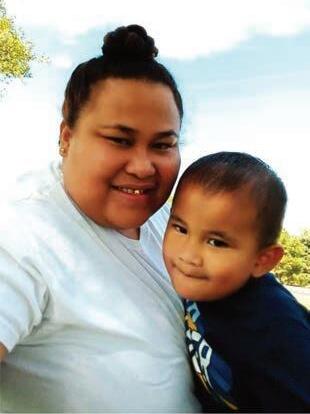
The Asian American, Native Hawaiian and Other Pacific Islander (AANHPI) designation contains over 50 ethnic groups and people who speak more than 100 different languages, representing 75 countries across Asia and the Pacific Islands of Melanesia, Micronesia and Polynesia. Colorado is home to nearly 300,000 people who can trace their heritage to these regions. The immense diversity within this classification warrants specialized attention to the unique needs that exist within Colorado communities.
Healthcare access is a critical aspect of well-being, yet for Pacific Islanders in the Denver metro area, there are significant challenges to overcome as a result of being classified into such an expansive group. Often, cultural barriers hinder
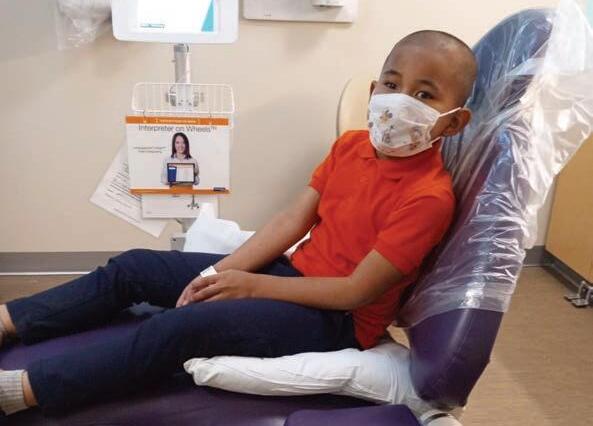
access to vital healthcare services, complicating the navigation of services available to Colorado residents. Language differences and unfamiliarity with the local healthcare system can create communication challenges, making it difficult for people to seek and receive appropriate medical care.
Denver and its surrounding communities lack sufficient healthcare infrastructure that meets the needs of many people of color, including Pacific Islanders who are often included in the vast AANHPI classification, often without differentiation.
Vivian Metekan, a Micronesian native faces healthcare challenges with her 7-year old son, EJ, who has a disability. “It was hard at first because not only did I not understand or know the severity of my son’s condition but how was I going to be able to find out the right resources and appropriate care to help him?”
Metekan goes on to say that sometimes finding a translator can be difficult. “Usually, if I get paired with a translator, almost 90% of the time it’s over the phone and usually someone from outside the state of Colorado.”
Healthcare providers may not always possess the cultural competence needed to understand the health issues specific to Pacific Islanders. This lack of
awareness can lead to misdiagnoses or inadequate treatment, exacerbating existing health disparities.
Community outreach programs that specifically target Pacific Islanders can help share information about available health services, preventative care and resources. These programs can also address common health concerns within the community.
“Analyzing the needs of Pacific Islanders in Colorado can be challenging because there are numerous groups within the [AANHPI] designation, and they all have unique needs,” wrote Gabi Johnson, Media Relations Manager of the Colorado Department of Public Health and Environment (CDPHE).
“For instance, Colorado’s Asian population has relatively high vaccination rates, but that might not be true for everyone [who identifies as] AANHPI. However, because the overall vaccination rates are stable, other populations within that group might not get the focused resources they need. Foundations are beginning to examine the gap in philanthropic funding to AANHPI communities, including the recent development of [The Colorado AAPI Circle] housed in the Denver Foundation.”
CDPHE has also worked closely with the Asian Pacific
Development Center (now Aurora Mental Health and Recovery’s Cultural Development and Wellness Center), which continues to provide a range of behavioral health services and support to AANHPI people.
While there are many barriers and inequities facing AANHPI communities in Colorado, there is also great momentum to address those challenges, with ample opportunity to build upon the efforts of service organizations working to eliminate barriers.
Efforts such as the Colorado Lotus project, which uplifts the voices and experiences of AANHPI people living in Colorado, are an important step toward understanding disparities affecting AANHPI communities in Colorado, as well as identifying strengths within the community. The Colorado Health Institute website explains that the Colorado AAPI Circle-funded Lotus Project’s goal is to “achieve a more equitable allocation of resources and to tear down the idea that the AANHPI community is a monolith.”
The project compiles data around demographics, housing, income and economic opportunity, crime and justice, democracy and health, with the hope that in addition to creating equity within each category, the state of health for AANHPI people will be positively affected by improved access to physical and mental care.
Elevating the insights from this and other work concerning Pacific Islanders and AANHPI communities at-large will be instrumental in fostering equitable access to healthcare and advancing the well-being of AANHPI communities across the state..
Editor’s Note: For more information about the Colorado Lotus Project, visit www.coloradohealthinstitute.org/programs/coloradolotus-project.
Denver Urban Spectrum — www.denverurbanspectrum.com – May 2024 9
Missing and Murdered Indigenous Relatives A National Day of Awareness
By Mona Cedilla & Christen Aldridge
SSince 2017, May 5 has been recognized as the National Day of Awareness for Missing and Murdered Indigenous Women and Girls (MMIW). Proclaimed the national Missing and Murdered Indigenous Persons Awareness Day by President Joe Biden in 2021, the day is one of remembrance and mourning for many. In a stark contrast to gleeful Cinco De Mayo celebrations, indigenous communities across America are calling for awareness and attention to a tragic, worsening crisis.
According to the National Institute of Justice, more than four out of five (84.3%) Native American women will experience violence in her lifetime. These numbers confirm harrowing statistics that place Native American women at the top of the list as the largest group of victims of sexual violence, stalking and physical violence by an intimate partner.
May 5 was first selected as a day of remembrance to honor Hanna Harris, a 21-year-old single mother from Lame Deer, Montana, who was born May 5, 1992. When Harris went missing on July 4, 2013, the local police did not take the situation
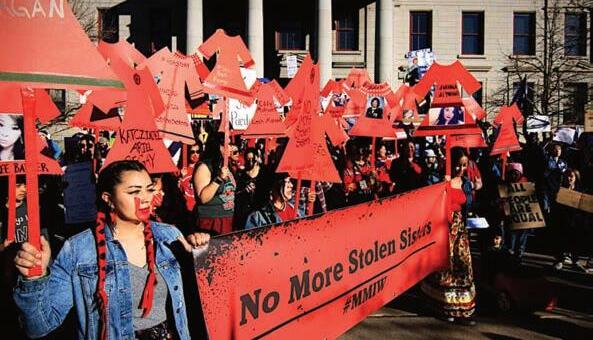
seriously. Her family gathered its own search party and discovered Harris’ body four days later, on July 8. Harris, who was from the North Cheyenne tribe, had been sexually assaulted and was found beaten to death on the North Cheyenne Indian Reservation.
Missing and Murdered Indigenous Persons Awareness Day is held each year to raise awareness of the victims and those who are currently missing. During events honoring
MMIW, advocates share stories about problems they have experienced within the judicial system, lateral violence, information and resources. Many participants of rallies and marches are seen with a red hand painted over their mouth. The red hand symbolizes the voices of the missing, for those who are not heard. It also represents media and law enforcement, both of which are often silent in MMIW cases.




Find the best fit for your child’s education Visit DenverEdExplorer.org to use the free tool.
Denver Urban Spectrum — www.denverurbanspectrum.com – May 2024 10
MMIR Task Force Demonstrating
A Voice for the Silenced
Trennie Burch from the Missing and Murdered Indigenous Relatives (MMIR) Task Force of Colorado states that there is often pushback when trying to file a missing indigenous person report.

“It’s a lot of ‘Well they’re off partying. You know, they’re off to a party. They’re off having fun, fun with their friends. They’re into drugs, we should expect this.’ There’s a lot of, ‘Oh, well, they chose to be houseless, and that’s a life that they want to live.””
In the last few years, Colorado has passed two pieces of legislation aimed at addressing the growing issue. SB22-150 created the Office of Missing and Murdered Indigenous Relatives (OMMIR), which works with the Colorado Bureau of Investigations (CBI) to respond to MMIR cases. OMMIR is also responsible for the development of a Missing Indigenous Person Alert (MIPA), yet there are loopholes when it comes to meeting the criteria for the missing. The main complaint about MIPA is the need for an investigating officer to believe the person is missing and indigenous before they file a report. If the officer is dismissive of the situation or demands proof and there is no documentation currently available, they can refuse to file a report.
SB 23-054 was added on to SB22-150. It increases the duties of OMMIR to include the operation of a hotline, shared data with other agencies, liaisons for families and MMIR training to advocates.
Both bills are meant to provide advocacy by assisting families and applying pressure to law enforcement entities to ensure the issuance of MIPAs.
The legislation also supports the organization of MMIR events across Colorado, while providing training for law enforcement, presentations at conferences and colleges, and resources for searches – including searches conducted by drone.
Having two pieces of legislation sets a precedent for addressing MMIW cases in Colorado. Activating a MIPA is a good first step, but there is much more work to be done to reduce the number of MMIW cases overall.
Burch confirms, “For a missing indigenous person alert you have two days for law enforcement to issue the report. Right now, it’s taking them an average of 7 to 10 days to issue it. When I say they really have a disregard for Native lives, they really do have a disregard. As a task force, we’ve actually had to contact law enforcement ourselves and say, ‘Look, this person’s family is trying to reach you. Why is there not a missing person report going out?”
The MMIR Task Force of Colorado is a grassroots organization made up of volunteers. The courageous group of women includes Daisy Bluestar, Trennie Burch, Lynette Grey Bull, Raven Payment, Danielle SeeWalker, and Monycka Snowbird. Together they work on raising awareness, developing policy, advocacy, data compilation, implementing training and conducting “boots on the ground” searches for the missing. The group led efforts to get SB22-120 and SB23-045 passed and are known for working alongside CBI to create special alerts when law enforcement denies an MIPA. Their website currently lists over 90 relatives – including children –who are missing, in addition to unresolved cases.
Frustrated, Burch shares, “Somebody from Southwest Colorado was like, ‘My son is living in Denver. I can’t get a hold of him. It’s been a couple
of days. I’ve tried to call the police, nothing.’ So, over a span of one to two days we called and called and called to try to get a missing person report. Nothing. We left messages, we called…nothing. No callbacks; no reports being made. Luckily, in a day and a half, we were able to locate the individual. But that’s the repeated cycle we get – nobody answering; nobody calling back; nobody caring.”
Burch continues with an even more concerning situation, “Raven (Payment) and I, in one of the cases, had to actually stop an officer on the street and say, ‘Hey, we have a missing person. Nobody will take a report. We need you to take a report right now.’ And he didn’t even want to take it then. And we’re like, ‘No, this is a missing person! We’re part of the MMIR, a task force in Colorado.’ We’re reporting that this person was there and their family was actually there getting ready to do a ground search. Finally, after 20 to 30 minutes of talking to them, they were like, ‘Okay, okay, we’ll do it.’ It took three weeks for us to find this person – this person was actually drugged in Downtown Denver, and they were being trafficked.”
Spreading Awareness Through Artistic Expression
Kristina Maldonado-Bad Hand, is an artist who uses art to heal and spread awareness about the MMIW crisis.
“I have been drawing since I could hold a pencil,” Maldonado-Bad Hand says. “I am an illustrator and graphic designer, and I like to merge past and present themes in my artwork and work with mixed media.”


for topics that are important to Indigenous people, particularly the MMIW and MMIR epidemic. She is Sicangu Lakota and Cherokee, from Taos, New Mexico, and is enrolled in the Rosebud Sioux tribe.
“My work centers on many cultural topics and pop culture narratives,” she says. Along with being published 12 times (mostly in comic anthologies) Maldonado-Bad Hand has lent her talent to local Native nonprofits and has successful partnerships with Meow Wolf, Denver Arts and Venues, Denver Museum of Nature and Science, Denver Art Museum, Redline Contemporary Art Center, various schools and tribal governments. She also organizes and runs an Indigenous Comic and Art festival called áyA Con. Showcasing her signature digital art style, she weaves activism and art together as one.
Art is more than just her passion – it is her tool of activism
“I feel like art is imperative to activism. When you don’t have the words to express a feeling it can be accomplished through art.” she says. “As an artist, I have created stickers and illustrations, and I created a scarf to raise awareness about Missing Murder Indigenous Women and donate funds to support the families affected. I have donated the funds from these scarves to specific families, but I also have a sum that
Continued on page 12
Denver Urban Spectrum — www.denverurbanspectrum.com – May 2024 11
Continued from page 11 will be going to a local domestic abuse prevention organization as well.” she explains.
“The one I am best known for is the image on my scarf, it features the ‘Hear No Evil, See No Evil, Speak No Evil’ scene, and represents how we often try to avoid problems by not hearing, seeing, or speaking about them. I found this to be true when it comes to MMIR and MMIW cases that are treated as a problem or an inconvenience by law enforcement. When there is a missing Indigenous person, regardless of their circumstance, they should be given the same respect and dedication as everyone else.”
Using Dance as a Form of Resilience
Kayla MB is an AfroIndigenous/Eastern European multimedia artist from Colorado. She represents the Southeastern tribes removed from ancestral homelands in Oklahoma’s Creek Freedman, Chickasaw and Choctaw Land lineages which were involved in the Mississippi Land Allotments under the Pontotoc Treaty. She expresses her activism through artistic dance.

“Dance in Indigenous com-
to more Indigenous forms of dance led by cultural leaders such as West African Dance, Indian Folk dance, and Native social dances,” she says.
The dancer studied leadership and entrepreneurship at Colorado State University before graduating with a degree in Arts in Dance. She has performed and choreographed with Y�haw� Indigenous Creatives Collective, Cleo Parker Robinson Dance, Osage Ballet and The Public Theater New York City, in addition to performing in the 5 Points Nutcracker Savoy last winter. She is the owner of the Banks Movement Company and has worked as an experienced

Maldonado-Bad Hand’s
scarf shows three women with red handprints on their eyes, mouths, and ears. Her art has been healing for families who have lost a loved one to the horrific epidemic.
“I love doing portraits and have been asked to create memory pieces. I also created an MMIR piece that features a white buffalo and jingle dress dancers for the Women of the White Buffalo film project and NFT gallery,” she says.
munities is prayer; it is conflict resolution; it is powerful. Dance is used in so many ways from coming of age to war dances,” she notes.
Since she was young, MB has danced and witnessed the artform’s connection to her Indigenous heritage. “I was always moved and inspired by the Pow Wow dances I grew up seeing in Denver (March Powwow) and in Oklahoma. I started dancing hip hop, jazz and ballet classes, and later took


dance teacher at Colorado Ballet and Cleo Parker Robinson Dance.
MB uses dance to connect with both her Indigenous and African heritage, while honoring MMIW. “As a dancer, I represent the resilience of the women on the stage, weaving together stories of African and Native ancestry. This relates to the MMIW movement because I usually weave in colors of red –which, in the movement, represent the blood lost and shed.
Mvto,” or “Thank you” she says in Cherokee.
Missing and Murdered Indigenous Persons Awareness Day 2024
This year on May 5, the MMIR Task Force will host an MMIR Rally at Acacia Park in Colorado Springs. Participants are to meet near the bandshell in Acacia Park and will continue to City Hall before ending at the “Take Back the Power” mural.
Attendees are encouraged to wear the color red or a ribbon skirt and bring a hand drum. Jingle dress dancers are needed to perform during the demonstration. All are welcome to participate, and Indigenous people will lead the march in honor of their loved ones.
Murder is the 3rd leading cause of death for Indigenous women, with victims less than one year old to 83 years old having lost their lives to preventable violence. In addition to participating in remembrance ceremonies and holding space for the lives lost to tragic violence, it is important to remember the role that systemic inequities have played in creating historical trauma, which has plagued the lives of Indigenous Americans for hundreds of years..
Editor’s Note: For more information about the MMIR Task Force of Colorado, visit www.mmirtaskforceco.com

Your retirement... DREAM or NIGHTMARE? Myra Donovan, CFP Financial Adviser* 3200 Cherry Creek Drive South, #700 - Denver, CO 80209 303-871-7249 Office • www.myradonovan.com Call today for a free consultation! *Registered Representative for NYLIFE Securities LLC (Member FINRA/SIPC), a Licensed Insurance Agency. Financial Adviser for Eagle Strategies LLC. a Registered Investment Adviser. Eagle Strategies, LLC and NYLIFE Securities, LLC are New York Life companies. Denver Urban Spectrum — www.denverurbanspectrum.com – May 2024 12
o celebrate the power of Black art in all forms while inspiring and mobilizing individuals to act, the Black Resilience in Colorado (BRIC) Fund will host a conversation with two of Colorado’s own dance legends. Karlya SheltonBenjamin, one of the first Black ballerinas with the Dance Theatre of Harlem, and Cleo Parker Robinson, founder of Cleo Parker Robinson Dance, will participate in a conversation on May 22 at 5 p.m. at the Cleo Parker Robinson Dance Theatre.
Both dancers understand that dance, with its stirring performances and poignant storytelling, can move audiences and ignite a sense of urgency around pressing issues.
Artistic expressions often illustrate resilience, resistance and hope, which can serve as catalysts for social movements and collective action. During the event and throughout the remainder of the year, the BRIC Fund will recognize the importance of dance as part of its focus on Art and Activism.
Black Resilience in Colorado Fund Celebrates Art and Activism with Free Community Event
Featuring a conversation with dance legends Karlya Shelton-Benjamin and Cleo Parker Robinson


The evening’s conversation will be moderated by LaDawn Sullivan, BRIC Fund’s Executive Director, and will explore Shelton-Benjamin’s dance journey, beginning at age four with the Colorado Concert Ballet (now Colorado Ballet). At 17, she became the first person of color to represent the United States in the prestigious Prix de Lausanne ballet competition in Switzerland. She performed around the world with the Dance Theatre of Harlem, is a founding member of Peridance and has taught and coached at Oakland Ballet and Cleo Parker Robinson Dance.
The conversation will also feature discussion about the
book “The Swans of Harlem,” by author Karen Valby, who shares a forgotten story about the pioneering group of five Black ballerinas – including Shelton-Benjamin – who were the first principal dancers with the Dance Theatre of Harlem. They traveled the world as highly celebrated stars in their field, yet their legacy was erased from history until now. These Black ballerinas share 50 years of sisterhood and the reclamation of their groundbreaking history.
“‘The Swans of Harlem’ brings to life the stories of Black dancers whose contributions to the world of ballet were silenced, marginalized and otherwise erased. Valby introduces readers to important fig-
the way for future generations of Black ballerinas,” explains Sullivan. “Their perseverance, talent, and determination challenged the racial norms of ballet to move towards creating a more inclusive environment for dancers of all backgrounds. But more importantly inspiring individuals to always continue to pursue their dreams despite adversities.”
This community event is free and open to the public. Refreshments will be served and books will be available for purchase. RSVPs are required, as seating is limited.

ures of our past, while inspiring us to courageously chase our dreams,” remarked Misty Copeland, the first Black female principal dancer for the American Ballet Theatre, in a review of the book.
A focus on Art and Activism further reinforces the BRIC Fund’s core values, which include supporting and celebrating Black excellence through the work of organizations, grassroots programs and individuals doing extraordinary work in the Black community to eradicate systemic inequities and open the doors of opportunities for future generations.
“The story of the ‘Swans of Harlem’ tells how these women not only achieved success in their own right but also paved
About Black Resilience in Colorado (BRIC) Fund
The Black Resilience in Colorado (BRIC) Fund is the first Black-focused community fund established in Colorado, explicitly providing financial resources and support to Black-led and serving organizations. Established in 2020 on the Juneteenth holiday, BRIC is more than a fund; it is a movement for change to address systemic racism and inequities that negatively impact Black communities throughout Colorado and beyond. BRIC empowers diverse organizations and individuals to invest in the sustained growth of Black-led and serving nonprofits to ensure their work continues and the communities served are not left behind. Since its inception four years ago, the BRIC Fund has distributed more than $4 million to over 300 nonprofit organizations.. Editor’s Note: To RSVP, visit www.bricfund.org and click on “Swans.” For more information, contact the BRIC Fund at info@bricfund.org.
T
Denver Urban Spectrum — www.denverurbanspectrum.com – May 2024 13
The Spirituals Project
Announces its 2024 Symposium: “Prayer, Protest and Praise”
An exciting line-up of guests will speak on the topic of prayer and how it functions as one of the primary themes of Negro Spirituals.
After Emancipation, there were many who wanted to divest themselves of any vestiges of slavery, which included the singing of spirituals. From the Civil Rights Movement through the early 2000s, a large portion of the Black church sought to attract young adults who had left the church by bringing in more contemporary or popular music. This further resulted in the fading out of hymns and spirituals.
The goal of the 2024 symposium is to engage local Black churches and re-interest them
in the singing of spirituals through the vehicle of prayer. The day will conclude with an evening performance by The Spirituals Project Choir, presented by CPR Classical.
The symposium and concert will take place on Saturday, May 18 at the Robert and Judi Newman Center for the Performing Arts on the University of Denver campus. The symposium will begin at 11 a.m. with a keynote address, “Down Here Lord, Waiting on You: An Exploration of the Theological and Devotional Legacy of the Negro Spiritual,” by Dr. Tammy L. Kernodle, who is an internationally recognized musician and scholar. The program will continue with an address by Rev. Dr. Lee Butler, the newly appointed president of the Iliff School of Theology. A panel discussion will feature Dr. Kernodle, Dr. Butler, renowned choral conductor and composer Rollo
Dilworth (who also will be featured as guest conductor for the evening concert), and local pastors. The panel discussion will center on why the spirituals are still relevant today and how pastors can integrate them into their services. Finally, Dr. Arthur Jones, founder of The Spirituals Project, will discuss the spirituals as a form of contemplative prayer, which is one of the themes of a new epilogue in the recently released 30th anniversary edition of his book, “Wade in the Water: The Wisdom of the Spirituals.”
Registration for the symposium is now available. Admission is free and open to the public. General admission for the 7:30 p.m. concert in the Newman Center’s Gates Concert Hall is also free, with a limited number of $5 tickets available for reserved seating in the parterre section of the hall. Tickets are required for both general admission and parterre seats..
Editor’s note: To register, visit https://bit.ly/3U6f3cp. For tickets, visit https://liberalarts.du.edu/ node/37234. For more information about the Spirituals Project, visit https://liberalarts.du.edu/lamont/sp irituals-project
About the Spirituals Project: The Spirituals Project was founded in 1998 with a mission to preserve and revitalize the music and teachings of the sacred songs called spirituals, created and first sung by enslaved Africans in America in the 18th and 19th centuries. In 2016 The Spirituals Project became an official program of the University of Denver Lamont School of Music.

SAVE THE DATE!
October 19, 2024

Denver Urban Spectrum — www.denverurbanspectrum.com – May 2024 14
A Long Life of Kindness
Celebrating Willie Mae Hicks Brown’s 103rd Birthday
By Ruby Jones
Willie Mae Hicks Brown was born in Post Oakes, Texas, on Jan 2, 1921. This year, as she turned 103 years old, the centenarian was celebrated for her citizenship and lifetime achievement.
Brown was raised by her parents, Willie Hicks and Lillie Jane Brown Hicks. She had one older brother, Charles D., and five younger siblings named Maude Ester, Rozell, Lee Homer, Tommy and Baby Emma. In 1945, after marrying Connie Brown, she moved to Denver, Colorado, where they raised four children. In their 60 years of marriage, the Browns were blessed with eight grandchildren, and many great and greatgreat-grandchildren.
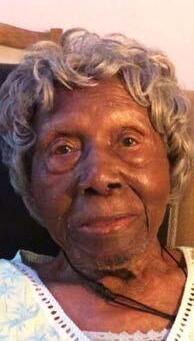
For 30 years, Brown worked at the Swift and Company meat processing facility and Gold Star Meats. After retirement, she and her husband moved back to Manor, Texas, where they opened their own restaurant, “Brown’s Cafe.” Brown enjoyed serving her community mouth-watering, home cooked meals; she also loved to sew and garden, and she never drank or smoked.
She has traveled the world, visiting beautiful places like Belize, Honduras and the Bahamas in addition to several states.
Returning to Denver to live with her son, John, and daughter-inlaw, Priscilla, Brown remains an active member at Genesis Missionary Baptist Church. She has served as Mission President, Pastor’s Aide, Superintendent, Sunday School Teacher, and as a member of the Genesis Missionary Choir – one of her favorite songs is “Come On in the Room.” Her son is the Senior Pastor of the church, and his wife, who was born in Meridian, Mississippi, is the Executive Director of the Black United Fund of Colorado (BUFCO), founded by Hiawatha Davis Jr., in addition to working as a real estate broker.
Brown credits her long life to following the advice of her mother, who instructed her to always follow God’s word and learn skills to stay independent. She encouraged her to be kind, honest, strong and learn from her mistakes while always striving to do better and trying to be a blessing to others.
Throughout her life, she has seen the value of planting good
seeds. She is known for uplifting people’s spirits with positive words, jokes or songs, and shares her wisdom with others. One of her greatest pieces of advice for children is to talk less, listen more, obey the instruction of their parents and go to church. She also encourages families to stay together, and express their love for each other often.
Brown was honored as a 2023 Random Acts of Kindness Award recipient just months before her 103rd birthday. A celebration for honorees was hosted by the Sisters Enterprise on Nov 11, 2023, with co-founders Betty Reynolds-Funderburke and Elinora Reynolds-Brown at the helm.
Award-winning keynote speaker, Dr. Michelle Mras, delivered a message titled, “United We Stand,” and musical artists Timofii Salomatina and Connie Akins chatted with the centenarian by video. Brown is treasured by all who know and love her. She is praised for her many years of commitment to her family, her community and God. .
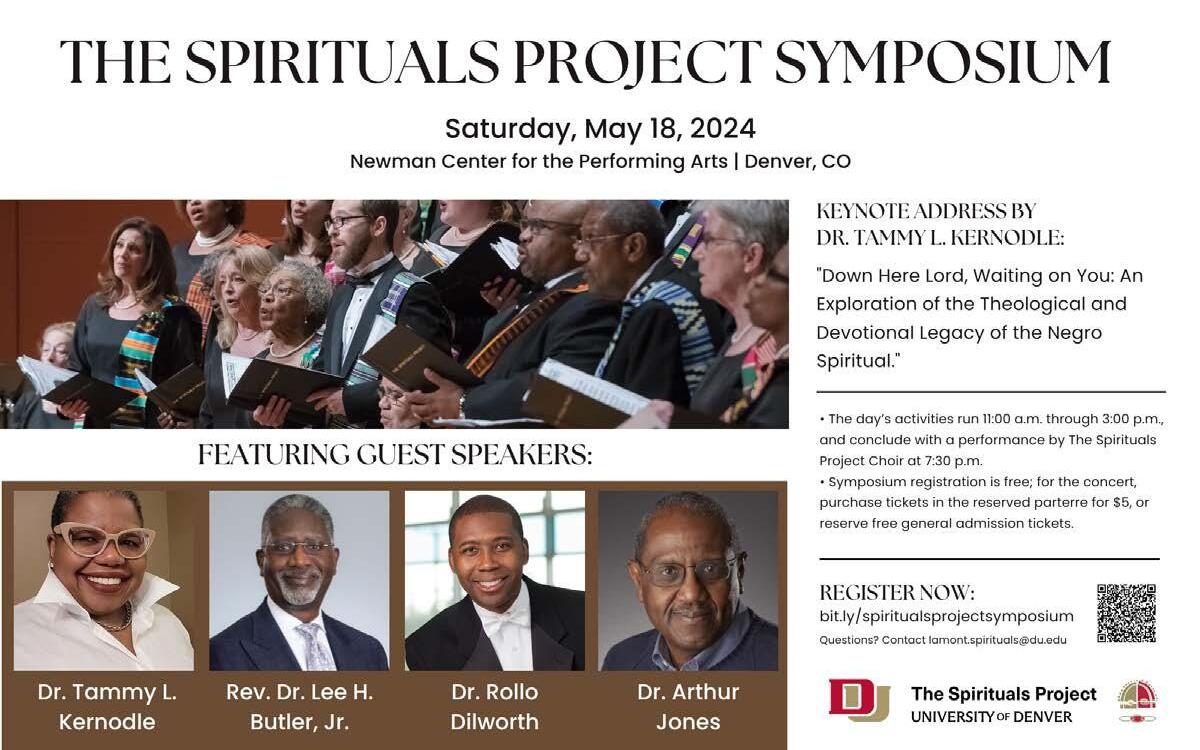
— www.denverurbanspectrum.com – May 2024 15
Denver Urban Spectrum
Amy Ruth: Navigating Challenges and Building Community
The Journey of Immigrants in Colorado The Journey of Immigrants in Colorado
By Melovy M. Melvin
Colorado has experienced a surge of migrant arrivals in recent years. In 2023 alone, for example, many have traveled from Venezuela. The migrant groups relocating here come from all different backgrounds, influenced by their own experiences – such as the urgency to flee conflict, persecution, climate change, or large-scale human rights violations in their home countries.

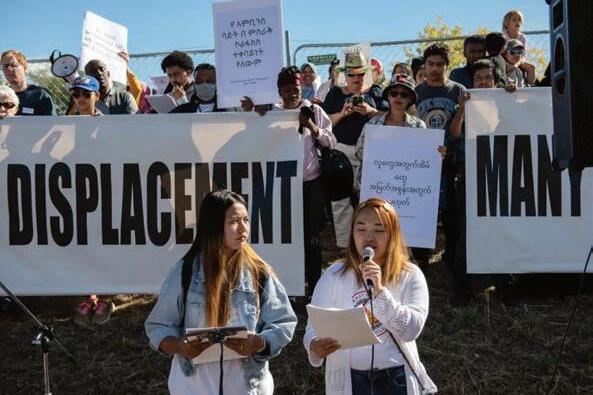
and leads to her role as an experienced community navigator.
As we observe the current influx of Venezuelan migrants, we have witnessed firsthand the challenges and triumphs people have encountered as they navigate the complexities of immigration and strive to settle into their new home.
Amy Ruth knows the challenges and triumphs all too well. Her own transformative journey begins with her arrival to Colorado as a Thai refugee,

Ruth’s journey from Thailand – which began seven years ago – offers a portrait of the struggles and successes of immigrant groups striving to build lives in the U.S., specifically in Aurora and the Denver metro area. She recounts the hurdles she encountered upon her arrival, including overcoming language barriers and navigating the nuances of accessing healthcare and assistive benefits. Experiences like hers emphasize the importance of tailored support systems such as community resources and special case managers, to facilitate the integration process and ensure equitable access to essential services. Ruth’s experience sheds light on broader issues faced by immigrant communities.
Amid efforts to recover from the pandemic, she found a meaningful role at the East Colfax Community Collective (ECCC), offering her a chance to contribute to and engage with the community – particularly migrants. However, the lasting impact of the pandemic brought forth additional obstacles, notably in healthcare access for her family.
“The pandemic was extremely hard for us, especially for my mom who wasn’t able to apply for Medicaid because of income requirements despite me being the only one
working at the time. It was one thing to try to access health services but for people like my mom, who just moved to Colorado, trying to go through the application process was very difficult,” she says.
She notes that a lack of access to healthcare services and challenges applying for and understanding insurance were common themes for many migrants she encountered, especially for Asian American and Native Hawaiian and Other Pacific Islander (AANHPI) people. She experienced the threat of losing Medicaid coverage due to delays in the application process, revealing systemic flaws affecting vulnerable households.
Another prominent issue
Ruth highlights is the housing crisis faced by AANHPI and other immigrant groups in metro Denver. Escalating rents, sometimes increasing by $300 annually, forced families into overcrowded living situations, with multiple individuals sharing a two-bedroom apartment.
Among the barriers faced by the AANHPI community, language and education also emerged as significant challenges. “The AANHPI community alone has so many unique dialects and languages and sometimes that can be overwhelming and [often overlooked.]”
Ruth describes a time when she tried to assist her mother in translating a document that a
Denver Urban Spectrum — www.denverurbanspectrum.com – May 2024 16
Photo by East Colfax Community Collective

case worker had given her, but that it was in the wrong dialect of the Thai language her mother speaks. Limited educational opportunities prior to immigration have also hindered access to jobs requiring English proficiency, leaving many individuals stuck in low-wage positions.
She urges decision-makers to move beyond assumptions and actively engage with the community to truly understand
their needs. To address these issues, she stresses the necessity of action over mere promises. Building trust, she argues, requires tangible changes that the community can witness.
In terms of successful partnerships, she highlights the positive impact of collaborating with organizations such as ECCC where she worked, or the Asian Pacific Development Center (now Aurora Mental Health and Recovery’s Cultural
Development and Wellness Center) and local food banks. These partnerships can provide migrants real, vital support, offering assistance with food, mental health services and program enrollments.
Ruth sees opportunities for both individuals and state leaders. “Many people have the freedom to voice their concerns and advocate for themselves. Instead, they often are afraid and hide or try to downplay their struggles, believing they are powerless to affect change, especially because of where they migrated from or how their journey was when arriving here but that’s not true…every voice has power. And it would be more helpful if the community and the state worked together to help all of them,” she says.
“So, I would encourage people to speak up because collective voices have the power to create meaningful change.”.


Denver Urban Spectrum — www.denverurbanspectrum.com – May 2024 17 Mail Box Express 4860 Chambers Rd. in Denver 303–375–1683 Business 303-375-1684 Fax mailmadez@yahoo.com #1 in Customer Service Proudly serving the community since 1995 ~Deborah and Oliver Sanders~ Open: Monday-Friday 9 AM to 6 PM Saturday 10 AM to 2 PM •UPS Drop Off •Domestic and International Shipping •USPS Mailing Services •Truck Rentals - Local and One-Way •Faxing - Local and Long Distance •International Sending and Receiving •Computer Time Rental and Scanning Laminating Copies Keys Made Business Cards Postcards Notary Service Binding Service Mailbox Rental Mail Forward
Photos by East Colfax Community Collective
Wesley Learns About Real Estate
 By Ruby Jones
By Ruby Jones
The “Wesley Learns” children’s book series presents easy-to-understand information about financial investment, credit and insurance. The series, authored by financial expert Prince Dykes, is centered around Dykes’ son, Wesley, who is guided through important lessons to gain financial literacy while helping other children build important life and money skills. Now, Wesley is back – and this time, he’s learning all about real estate.
On April 12, Dykes announced the official launch of “Wesley Learns About Real Estate,” with an exciting community event at the Denver Broncos Boys and Girls Club in Montbello. The fourth book in the “Wesley Learns” series features guest star, Former Denver Broncos running back and NFL Hall of Famer, Terrell Davis, and covers topics such as buying, selling and renting properties to generate wealth.
First featured in the third book of the series, Davis sponsored copies of “Wesley Learns About Insurance,” for children at the Denver Broncos Boys and Girls Club in 2019. He appeared
in the book as a key influence, helping Wesley learn about the ways in which insurance impacts financial health. After retiring from football, the history-making athlete doubleddown on his commitment to strengthening financial literacy when he partnered with Alpha 1 Tax and Wealth, a wealth management firm offering a team of fiduciary professionals.
“I met Terrell Davis in 2018, and he really enjoyed the first two books,” says Dykes. “He came up with the idea to be featured in the third and fourth book.”
Available in both English and Spanish, “Wesley Learns About Real Estate” is full of engaging concepts and features, such as a QR scan code that transforms Wesley’s real estate journey into an animated production. Wesley navigates the world of real estate with his friends – Davis’ children, Dylan, Jaxon and Miles – as his parents teach him everything he needs to know about property rental and home ownership.
The free community book launch event was a success, with over 250 children and adults in attendance, including Denver Broncos Cheerleaders, Davis and his children. “The turnout was amazing,” says Dykes, who spent the days leading up to the event promoting the book on media plat-
who want to teach their children about financial investment, but aren’t sure where to start. Dykes facilitates educational opportunities from the lens of his experience as a financial advisor and a father, welcoming children and families everywhere to join in on the lessons he teaches his son.

forms around the Denver metro area on his “Wake ‘Em Up Tour.”
In addition to those attending the event, students at Dora Moore School and Montbello Middle School participated in a book club project sponsored by Dykes. They took a quiz after reading all three books in the “Wesley Learns” series, and were awarded a portion of $2,000 in S&P 500 stocks and the book launch.
“I think purchasing homes in the future will become even tougher for the next generation, because the rising cost of houses is outpacing living wages. This is why we must start investing as early as possible,” Dykes admits. He believes that the earlier children are taught fundamental financial tools, such as real estate investment, the better.
“I was blessed with great parents who were taught about saving, but like most Americans I wasn’t taught about the power of investing as a child.”
The “Wesley Learns” series is a wonderful tool for families
His devotion to helping future generations develop financial literacy led to the creation of the Global Children Financial Literacy Foundation (GCFLC). He serves as the founder and chief investment officer of Royal Financial Investment Group, and hosts a podcast covering a wide range of financial topics, including fundamentals of the stock market, wealth management and personal finance. “The Investor Show,” is featured on Denver Urban Spectrum’s Expanding the Narrative Podcast Network; and was recently named one of the Top Five Investing Podcasts in Colorado by FeedSpot.com.
“The most fulfilling part about the podcast is the ability to spread knowledge throughout the world,” says Dykes, as he readies himself for the next chapter in Wesley’s story.
In the coming weeks, the award-winning author will travel throughout the United States, sharing “Wesley Learns About Real Estate” with schoolaged children in Georgia, Maryland and Washington D.C., while spreading his message about the importance of financial literacy and inspiring people of all ages to take control of their financial futures..
Editor’s Note: To learn more about Prince Dykes, follow him on Instagram (@TheInvestorShow). The full “Wesley Learns” series is available on Amazon, Barnes & Noble, and everywhere books are sold.
Author Prince Dykes and Hall of Famer Terrell Davis believe it’s never too early to start building wealth.
Denver Urban Spectrum — www.denverurbanspectrum.com – May 2024 18



PRESENTED BY:

Chauncey Billups’ Journey to the Naismith Memorial Basketball Hall of Fame
By Wayne Trujillo
Basketball icon Chauncey Billups stands well over six feet tall. He also stands as a towering example of success succeeding strife; inspiration conquering frustration; and unwavering confidence overcoming doubt. Billups’ accolades – on and off the court – span decades. The latest feat may be the summit; a pinnacle of which every basketball player dreams, though few actually realize.
ESPN posted an Associated Press article on April 6, 2024, proclaiming, “Two icons from the 2000s era of basketball are headed to the Naismith Memorial Basketball Hall of Fame.” Billups is one of the two icons, and a hometown hero in his own right.
Success is Sweeter When the Road is Rougher
An induction to the prestigious Hall of Fame is a heady honor for the Denver native who had already assumed nearmythic status in the city’s Park Hill neighborhood, even before he entered George Washington High School.
Dubbed “The King of Park Hill” and “Smooth,” the youth dazzled friends, family and neighbors. His reach extended beyond Park Hill when he collected accolades and titles throughout high school. Billups’ entry on the Colorado Encyclopedia recounts a rush of honors bestowed early on. In 1995, he was named a McDonald’s All-American. He received First-Team All-State Honors throughout high school, Colorado Player of the Year twice, and was named Mr. Colorado Basketball thrice – an unmatched feat.

The early “King of Park Hill” and “Smooth” nicknames prepped the ascendant star for his global title, “Mr. Big Shot,” as he was affectionately known throughout the National Basketball Association (NBA) and the world.
However, the early years weren’t all as starry-eyed and smooth as his reputation suggested. Billups confronted early realities and was faced with decisions that ultimately determined his destiny. As the legend explains in a recent video interview, “Chauncey Billups –The Story You Haven’t Heard Before,” his path diverged from several of his early peers, some of whom he states were better players, simply due to preadolescent decisions. Billups talks about idle time without direction leading talented youth astray and away from their goals. Some of his friends and teammates were exiled from school and sports, while others chose paths leading straight into juvenile detention facilities.
“So that was the only example that I needed at a young age. I said, ‘Okay, I’ve got to start making my own decisions here,’” Billups states in the candid interview. “I can’t just go following people… or I need to find the right person to follow.”
5 FREE EVENT ARTSANDVENUES.COM/FIVEPOINTSJAZZ
Denver Urban Spectrum — www.denverurbanspectrum.com – May 2024 20
He says this realization struck him at 11 or 12 years of age. The all-around sportsman also stopped playing football not long after his epiphany, for practical purposes. Billups states that he was a better basketball player, and that any collegiate aspirations relied on securing a scholarship. So he dove deep, concentrating on excelling at the sport that could deliver his dream with singular focus.
Daring Decisions
In addition to making basketball his singular athletic outlet, Billups also made another fateful decision. He originally planned to enroll in an out-of-state college, but the loss of his grandparents during his final year of high school and his mother’s resulting ambivalence at his impending absence led him to unexpectedly decide to attend the University of Colorado (CU) Boulder. It was a decision that carried him a distance from his previous plans, but it kept him closer to home.
CU Boulder’s basketball team seemed a lackluster choice for the hotshot player at the time, but the ballplayer’s consideration and prioritization of his family when making the professional decision triumphed – as it would in later decisions.
“I just felt it in my heart, man, and in my spirit. I said it’s not time for me to leave,” he explains. “If I’m supposed to make it, I will make it…No
matter where I go.”
The young athlete enjoyed success during his college career. As his Colorado Encyclopedia states, “Billups brought the university a second-place Big 12 finish in their inaugural season in conference, and at one point had the team ranked eighteenth in the nation with a record of 14-3. That season, Colorado went to their first NCAA Tournament appearance in twenty-eight years. Billups led the 9-seed Buffaloes in an upset win against the 8-seed Indiana Hoosiers, 80-62, although they lost in the next round to North Carolina.”
According to Billups, two events conspired to abruptly end his college career and go professional. Piper, his thengirlfriend and current wife, was pregnant with their first child; and his mother was laid off from her job of 20 years. Both household bills and the NBA beckoned.
“I gotta go… it’s time for me to step up and earn.”
Going Pro
Billups’ confidence initially proved correct. He was selected as the third overall pick in the 1997 NBA draft by the Boston Celtics, which was assumed to bring stardom and financial stability for his family.
“However, through his first five pro seasons, Billups was more NBA vagabond than NBA star. He played for four different teams those first five years.
AFFORDABLE HOUSING – WE WELCOME YOU!
• HUD-subsidized housing available for individuals 62 & older or persons with disabilities. Additional household members welcome.
• 358 total apartments for rent (373 – 570 sq. ft.) - studios & 1-bedrooms.
• Mandatory meal program. Exemptions o昀ered. SNAP bene昀ts accepted soon.
• Apartments are waitlisted. Contact Leasing dept. for current wait time.

• Call, email, visit or download an application. Submit by email, in person, or fax. Drop o昀 box in lobby open 24/7:
22 S. Adams St., Denver CO 80209
Info@KavodSeniorLife.org or www.KavodSeniorLife.org
303.399.1146 | 800.659.2656 TTY
• Contact us for help completing an application or to request a reasonable accommodation.
Language assistance is available!
Kavod Senior Life is a non-pro昀t, non-sectarian organization providing housing & services to older adults & people with disabilities that does not discriminate on the basis of race, color, religion, national origin, sex, disability or familial status.
Coaches couldn’t decide if he was a point guard or a shooting guard. It left Billups frazzled, his career at a fork in the road,” recounts an article on the Colorado Hall of Fame website.
The athlete’s confidence was tested in short order, but a saving grace appeared in the presence and person of Terrell Brandon when Billups played for the Minnesota Timberwolves.
“Just the best dude ever,” Billups enthuses. “He took an interest in me that I felt really changed my career.” Billups learned from Brandon to concentrate on team performance rather than personal stats. “I didn’t play for stats,” he explains. “I went out saying, ‘We’re going to beat these guys’… to be considered in something like the Basketball Hall of Fame, having played that way, it just feels so good.”
That mindset, intelligence and talent led Billups to his fabled tenure with the Detroit Pistons, including the climatic 2004 NBA championship victory over the Los Angeles Lakers and his title as NBA Finals MVP that year. The Michigan Sports Hall of Fame website salutes him as integral to the team’s ascendency: “Nicknamed ‘Mr. Big Shot,’ for his ability to make late-game shots while with the Pistons, he was widely respected for his tenacious defense and clutch shooting. Billups was a key component in the Pistons rise to
the NBA elite, reaching the NBA Finals in consecutive seasons.”
A Lifelong Career
In 2008, the famed baller made his way back to his hometown, playing for the Denver Nuggets for several seasons before moving on to the New York Knicks and the Los Angeles Clippers. In 2013, he returned to the Detroit Pistons, where he retired from the professional sport the following year.
Now, “Mr. Big Shot” is still on the court as head coach of the Portland Trail Blazers. He leverages his experiences, insights and ability to connect with a new generation of basketball talent to score points decades after entering the big leagues as a player. In August, his legacy will be safely enshrined in the Naismith Memorial Basketball Hall of Fame, along with other accomplished basketball stars and memorabilia from the greatest moments in basketball history.
In his most recent role, Billups explains that coaching is a learning exercise, much like playing the sport involves a learning curve. He’s traveled some rough patches on both roads, but remains unfazed by the ride, convinced of his destination.
“I’ve always just felt like I will win,” the Hall of Famer asserts. “Sometimes not immediately. But definitely.”.

Denver Urban Spectrum — www.denverurbanspectrum.com – May 2024 21

Making transmissions well since 1983.
The Rise of Co-Living and Housing Affordability in Colorado: Pioneering Solutions in the Modern Real Estate Landscape
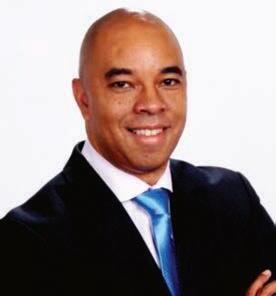 By Barry Overton
By Barry Overton
In today’s rapidly evolving real estate market, the surge in housing prices has far outstripped the growth of average incomes creating a significant affordability crisis, particularly in urban centers. This has compelled both individuals and industry stakeholders to explore alternative living arrangements. Among these, co-living has emerged as a formidable solu-

tion, addressing not only the affordability concerns but also reshaping social interactions within residential settings.
Understanding Co-Living
Co-living, at its core, is an innovative housing concept where individuals share living spaces, utilities and often amenities, while retaining private bedrooms. The idea is built around community and shared experiences, drawing inspiration from historical precedents like communal living movements of the past, but infused with modern amenities and technology. This model appeals especially to millennials and young professionals who are often more willing to trade personal space for enhanced social opportunities and lower living costs.
Economic Drivers
The primary allure of co-living spaces lies in their economic benefits. In major cities such as New York, San Francisco and increasingly, international cities like London and Berlin, the cost of living has soared to such levels that traditional homeownership or renting private apartments is out of reach for many young professionals. Coliving spaces offer a more affordable alternative, where residents typically pay less than they would for conventional apartments in the same neigh-
borhoods. This affordability is achieved through economies of scale and more efficient use of space.
How Colorado Government is Getting Involved
Governor Jared Polis has officially enacted HB24-1007, a pivotal piece of legislation that removes residential occupancy limits across Colorado. Signed on April 15, this law, effective from July 1, aims to broaden housing opportunities and combat discriminatory practices regarding the number of occupants permitted in a dwelling. Specifically, it restricts municipalities from imposing or maintaining ordinances that limit residential occupancy solely on the basis of individuals’ relationships to one another. This development marks a significant change from long standing ordinances such as Fort Collins’ “you plus two” rule, which previously limited home-sharing to three unrelated individuals, regardless of the home’s size or bedroom count. This legislative change reflects a progressive step towards inclusivity in housing policies within the state.
Social and Lifestyle Appeal
Beyond economics and government inclusion, co-living taps into a cultural shift towards valuing experiences over ownership. Residents

Denver Urban Spectrum — www.denverurbanspectrum.com – May 2024 22
enjoy built-in communities with shared kitchens, lounges and sometimes even co-working spaces, facilitating both social interaction and professional networking. These communal areas are designed to foster a sense of community, offering regular activities and events that encourage a collaborative lifestyle.
Technology and Management Efficiency
Technology plays a pivotal role in the management of coliving spaces, enhancing the resident experience while streamlining operations. Digital platforms enable everything from automatic rent payments to community engagement, maintenance requests and room bookings for private events. This tech-forward approach not only appeals to tech-savvy young adults but also increases operational efficiencies, reducing costs for both operators and residents.
Challenges and Considerations
Despite its benefits, co-living is not without challenges. Privacy concerns are significant, with residents sharing many common spaces. Furthermore, the transient nature of co-living can lead to a lack of long-term community stability, which is often vital for fostering deep personal connections. Regulatory hurdles also pose a challenge, as zoning laws in many cities are not yet adapted to this innovative housing model.
The Future Outlook
The co-living sector is poised for significant growth. According to industry analysts, the global market for co-living is expected to expand as more people move towards urban areas and seek out both flexible and affordable living arrangements. Real estate developers and investors are taking note, with many considering co-liv-
ing projects as a part of their portfolio, attracted by the potential for higher density and occupancy rates compared to traditional rental models.
Impact on Housing Affordability
Co-living contributes to solving the housing affordability crisis by not only providing more cost-effective housing options but also by potentially driving down prices in the broader market through increased supply. If co-living continues to grow in popularity, it could compel the market to adapt, offering more varied housing solutions to meet the diverse needs of the population.
As the landscape of urban living continues to evolve, coliving represents a critical innovation in the fight against the housing affordability crisis. By combining affordability with a community-focused lifestyle, co-living addresses both eco-
nomic and social dimensions of today’s housing challenges. For real estate professionals, embracing this trend could mean opportunities to lead in a market hungry for solutions, driving both business success and social impact.
As we look forward, the integration of co-living into the broader housing market will likely continue to expand, driven by economic necessity and a shift in lifestyle preferences. For many, especially in high-cost urban areas, co-living might not just be a choice but a necessity, heralding a new era in how we think about home, community, and personal space in the 21st century.
Editor’s Note: Barry Overton is a licensed Real Estate with the Super Agents Collaborative Powered by eXp Realty. He has been an agent since 2001, and started investing in real estate in 1996. For more information, email: barrysellsdenver@ msn.com or call 303-668-5433. We help
If you want to give your little learner a head start for success in kindergarten and beyond, the Denver Preschool Program is here to help. We support Denver families like yours by reducing the cost of preschool tuition. Whether you have already enrolled in a preschool or are still looking for a program that fits your needs, we can help.
Learn more at DPP.ORG today!

families FIND & PAY FOR PRESCHOOL!
Denver Urban Spectrum — www.denverurbanspectrum.com – May 2024 23

Heralding both Mother’s Day and an exciting upcoming groundbreaking celebration, Cleo Parker Robinson
Dance (CPRD) will host a Spring Concert featuring legacy works choreographed by David Rousseve, Winifred Harris and the phenomenal Cleo Parker Robinson herself.
“Legacy: Opening the Way,” reflects on the guides, guardians, ancestors and community members whose support has been essential to the growth and progress of the Denver-based international dance company.



“2024 is a momentous year for us,” says CPRD Founder and Artistic Director, Parker Robinson. “The Spring Concert is only days ahead of groundbreaking for our facility expansion – literally doubling our ability to fulfill our mission.”
“Legacy: Opening the Way” features interpretive excerpts that illustrate the ways in which we traditionally recall, reclaim and rejoice.
“Our home, here in the historic Shorter AME facility, symbolizes our journey of strength, struggle, rebuilding and resilience. “Legacy: Opening the Way” celebrates the past, present and future of growing our dreams from the ground up to new heights,” Parker Robinson exclaims.
A Mother’s Day to Recall, Reclaim & Rejoice
CPRD
Announces
Spring Concert, Legacy: Opening the Way
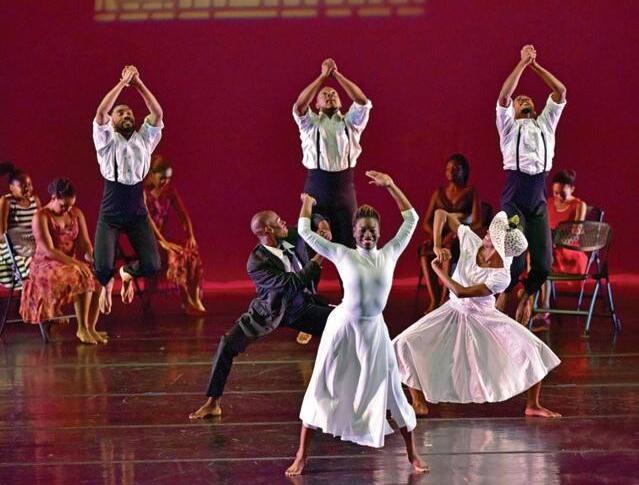
A full weekend of events will begin Friday, May 10 at 7:30 p.m., with a VIP reception on Saturday, May 11 at 6:30 p.m., and a Mother’s Day Matinee performance on Sunday, May 12 at 2 p.m.
The performance will begin with a celebratory processional, choreographed by Parker Robinson and the CPRD Artistic Team. After honoring the ancestors and all who have supported the CPRD mission and vision, “Spiritual Suite” excerpts, “To My Father’s House,” “Mary Don’t You Weep,” and “Roll Me Through the Rushes,” will be featured, followed by “One Nation Under a Groove, Part 2,” and “When Wet Came to Paper.” Poetry will be performed by CPRD Co-Founder, Schyleen Qualls, with musical inspirations featuring works by Nikki Giovanni and Nina Simone.
“The work is a tribute to those who have passed on, and those that are far from me/us. In joy we celebrate. The work is based on a poem that I wrote when Curtis Frazier passed and I was missing my friends. Curtis was a part of the CPRD Ensemble, and one of my first dance partners. The work is a moving poem. It is also a letter, as I’ve moved around the glove and created connections with
“Legacy: Opening the Way” will be held at the CPRD Theatre, located in Denver’s historic Five Points neighborhood at 119 Park Avenue West. Tickets for Friday and Sunday performances are available from $35 to $45 for youth, elders and adults. VIP tickets include a reception with heavy appetizers, refreshments and a first-edition copy of “The Swans of Harlem,” featuring Karlya Shelton-Benjamin, a retired ballerina and previous CPRD guest teaching artist, who will be in attendance during the VIP pre-performance meet-and-greet and during intermission.
people forever in our lives,” says Harris, whose “When Wet Came to Paper” choreography will be featured at the end of the performance.
All are invited to attend this moving performance in celebration of Mother’s Day and CPRD’s ongoing journey as it prepares to move into the next chapter..
Editor’s Note: For more information, email Patricia (Pat) Smith at pat@ontargetpr.net or call 303-8077086.
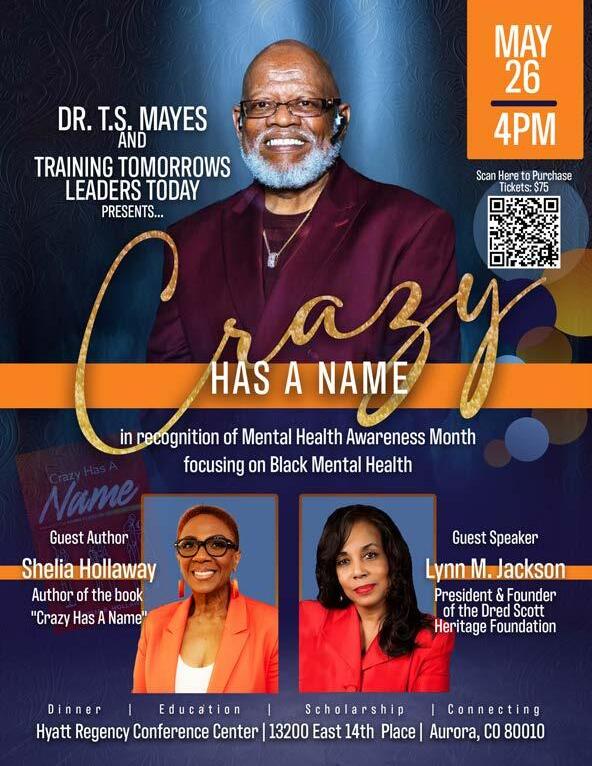
Denver Urban Spectrum — www.denverurbanspectrum.com – May 2024 25




Continued from page 3
•Only 25% of Black Coloradans have obtained a higher education degree, certificate or credential; and while Black Coloradans make up approximately 5% of the state’s population, they account for more than 23% of Coloradans experiencing homelessness.
•According to the Center for Disease Control (CDC), the Black maternal death rate is 2.9 times higher for Black women, and the infant mortality rate in Colorado is highest for Black babies.
•Nearly 65% of Colorado communities that were segregated through the discriminatory act of redlining in the 1930s are still primarily inhabited by people of color, and vulnerable to gentrification and displacement. We also know that a Black citizen is five times more likely to be stopped by police without just cause than a white person.
Without a thorough study examining the effects of past and present policies in Colorado, it’s difficult to quantify the extent of these disparities, their origin, how they might interact with or amplify each other, the long-term economic impacts, or how they might be addressed.
Countless other cities and states have conducted similar studies to investigate their policies and analyze the historical impact of localized systemic inequity. Racial justice studies have been nationally recognized as important tools that allow us as a society to quantify and qualify the impacts of past inequities and to make recommendations for better, more inclusive paths forward. But these types of studies are not just about Black Coloradans –they are about building stronger, more prosperous communities for everyone. In fact, studies show that working to reduce racial disparities could
increase the national gross domestic product (GDP) from 4 to 6%, because we are stronger when everyone has an equal opportunity for success.
We know now more than ever that not everyone’s stories are told, and throughout history there has been a tragic tendency to shy away from reflecting on the more painful parts of our past. We live in a time where history – and Black history in particular – is being revised, distorted and even erased.
Now, in Colorado, we have the opportunity and responsibility to reverse that trend.
We are thrilled to have the support of countless faith, business, education, advocacy, health care and civil rights organizations from across the state for this legislation, as well as the support of the Black Democratic Legislative Caucus.
As Rev. Dr. Martin Luther King Jr. once said, “Now is the time to make justice a reality to all of God’s children.” As a legislature, we must take action now, to shed light on our past so that we can build a brighter future.
Editor’s Note: SB24-053 has successfully made its way through the Colorado Senate. It will move through the House Appropriations Committee and the Legislative Council before heading to the Colorado House of Representatives floor for a final vote.
The Death of OJ Simpson, Beyond the Murder Charges

Op-Ed by Dante J. James
OJ Simpson died from prostate cancer on April 10, 2024. A quarter of a century ago, the brutal murder of

Letters, OpEds, Opinions
Denver Urban Spectrum — www.denverurbanspectrum.com – May 2024 26
Nicole Brown Simpson and her friend, Ron Goldman, shocked the nation and turned Simpson, a once-beloved football hall of fame hero, into a murder suspect.
What ensued before, during and after Simpson’s trial shined a spotlight on long-festering issues such as police treatment of Black Americans, domestic violence and the influence of wealth on the justice system. Simpson was defended by a “dream team” of lawyers, including Johnnie Cochran Jr. and F. Lee Bailey, and was ultimately acquitted by a jury in 1995.
The so-called “trial of the century” significantly affected race relations in America. Black and white Americans watched the same trial for months but reached different conclusions, expectations and interpretations.
Simpson’s acquittal represented a “racial divide,” with many more Black than white Americans cheering the verdict. Much of white America seemed unable to process the justice system’s failure to convict Simpson. At the same time, Black Americans were keenly aware that the judicial system had failed us habitually. Black and poor people were and continue to be victims of the “justice” system. The rare acquittal of Simpson was in stark contrast to thousands of situations in which white people killed a Black person, and no one paid any debt to society or anyone else.
Following Simpson’s death, people from various walks of life, including political analysts, late-night show hosts, celebrities and family members shared their thoughts. However, many of the comments seemed to be stuck in a bygone era and void of a structural analysis of racial tensions still prevalent and remaining unaddressed and unsolved.
As we analyze the meaning of Simpson’s life and his impact
on American society and the Black community, we know he was an incredible athlete, a cultural icon for his day and a breaker of two marketing barriers. Was he a murderer, and is that the only question we can and should continue to wrestle with?
Regardless of his guilt or innocence, Simpson died of prostate cancer, as did Dexter King – son of Dr. Martin Luther King and Coretta Scott King –actor Lou Gossett, radio host Joe Madison and thousands of unknown Black men. Simpson’s death presents an opportunity to bring a crucial issue to light –the racial divide in healthcare that leads to a disparity in prostate cancer detection and treatment. According to the advocacy organization ZERO Prostate Cancer, one in six Black men will develop prostate cancer in their lifetime. Research from the American Cancer Society shows Black men are more than twice as likely to die from the disease than their white counterparts.
Doctors and health advocates suggest that the reason behind the difference in death rates between Black and white people is due to historical and structural racism, lack of access to quality health care in many Black communities, mistrust and avoidance of the health care system and the stigma surrounding the disease. During a 1966 press conference with the Medical Committee for Human Rights, Dr. Martin Luther King Jr. stated, “Of all the forms of inequality, injustice in health care is the most shocking and inhuman.”
As a moral and humane society, healthcare professionals and advocates, pharmaceutical companies, doctors, community groups, local, state, and federal government and the media in particular, must use the spotlight on Simpson and his death from prostate cancer as a conduit to saving the lives of Black males.
It is doubtful that we will ever find out if Simpson was guilty or innocent of killing Nicole Brown Simpson and Ron Goldman. However, we do know that prostate cancer killed Simpson and is killing and affecting Black men disproportionately. As a society, we can address this issue by eliminating healthcare disparities and funding education and outreach programs targeted directly toward the affected population. Doing so can reduce the number of Black men who die from prostate cancer and mitigate the pain and anguish prostate cancer visits upon Black people and Black communities.
Editor’s note: Dante James, the owner of Black Pearl Media Works, is an independent filmmaker who has won multiple Emmy awards. He holds a BS degree from Grand Valley State University and a MALS degree from Duke University.
Health Groups File Second Lawsuit Against The US FDA While the Biden Administration Delays the Rule on Menthol, Death Toll Rises Daily
The African American Tobacco Control Leadership Council (AATCLC), Action on Smoking and Health (ASH), and the National Medical Association (NMA), represented by Christopher Leung of Leung Law PLLC, have filed a second lawsuit against the U.S. Food and Drug Administration (FDA) for the agency’s inaction on issuing a final rule banning menthol cigarettes. This lawsuit comes more than seven months after the FDA’s initial date for finalizing the new rule, and follows the FDA’s 15-year delay in equitable policymaking.
“The relentless and racist tobacco industry targeting has killed too many members of the Black community,” says Carol McGruder, AATCLC Co-Chair. “If Black lives truly matter, then
we must end the sale of menthol cigarettes and do it now!”
The Plaintiffs’ first lawsuit was filed on June 17, 2020. Since then, approximately 39,789 Americans have died from menthol cigarettes.
The initial complaint sought to compel the FDA to act on its earlier conclusions that removing menthol cigarettes from the marketplace would benefit public health. The lawsuit specifically asked the court to compel the FDA’s determination on whether to add menthol to the list of prohibited characterizing flavors – a determination that the FDA delayed making for over 10 years. The joint lawsuit followed the 2013 Citizen Petition from the Public Health Law Center, which called on the FDA to prohibit the sale of menthol cigarettes.
“We’re extremely disappointed to be forced to file this second lawsuit against the FDA in support of protecting Americans from menthol cigarettes,” says Laurent Huber, Executive Director of ASH. “The FDA’s own research confirms that a menthol ban would save lives; there is no scientific reason to delay finalizing this rule.”
In 2011, the FDA’s own scientific advisory committee concluded that the “Removal of menthol cigarettes from the marketplace would benefit public health in the United States.”
As a result of the Plaintiffs’ first lawsuit, the FDA made the landmark determination to add menthol to the list of banned characterizing flavors in cigarettes. To begin that rulemaking process, the FDA issued a Notice of Proposed Rulemaking to ban the sale of menthol cigarettes in the marketplace. Given that success, the Plaintiffs voluntarily dismissed their initial lawsuit.
Today, three years later, the FDA has failed to take the final step to formally promulgate and publish the proposed rule. After setting an initial date of
Continued on page 28
Denver Urban Spectrum — www.denverurbanspectrum.com – May 2024 27

How you feeling about your hair?

Continued from page 27
August 2023 to issue this rule, the FDA has unreasonably and unlawfully delayed this life-saving rule.
rettes make initiation easier, addiction stronger, and quitting harder. A ban on menthol cigarettes would save 6,000 Black lives every year.
Book Now!
•DM on Facebook
•Link on IG @Serenitihairstudios
•720-338-1181

AFRICAN GRILL &BAR
955S.KiplingParkway
Lakewood,CO80226
303-985-4497

Open: 11AMto9PM
Mondaythrough Saturday
•Dine-In•Takeout•Catering


“As African American physicians, we are deeply disturbed at the continuing delays in FDA’s finalizing of the ban on menthol cigarettes,” says Dr. Yolanda Lawson, President of NMA. “Our patients, more than any other group, become disabled and die prematurely due to the continued use of these cigarettes,” she says.
The Biden Administration has fallen for disinformation and fear mongering by the tobacco industry. The industry is sowing doubt and confusion, and taking advantage of real issues in our country while claiming that removing menthol will harm Black lives, when just the opposite is true. We remain disheartened to be forced to call on the Biden Administration to prioritize human life.
Attorney Christopher Leung states, “FDA’s delay in issuing a final rule is harming public health. As the FDA’s own analysis found, banning menthol cigarettes will reduce youth smoking, increase successful quit-attempts among current people who smoke, and save hundreds of thousands of lives – as well as billions of dollars spent on treating smokingrelated harms. It’s time for the FDA to act.”
Tobacco products kill when used as intended. Menthol ciga-

About African American Tobacco Leadership Council (AATCLC)
The AATCLC was formed to educate the public about the effects of tobacco on the Black American and African Immigrant populations, the tobacco industry’s predatory marketing tactics, and the need to regulate menthol and all other flavored tobacco products. To more effectively reach and save Black lives, the AATCLC partners with community stakeholders and public serving agencies to inform and direct tobacco control policies, practices, and priorities. For more information, visit www.savingblacklives.org.
About Action On Smoking and Health (ASH)
Founded in 1967, ASH is America’s oldest anti-tobacco organization, dedicated to a world with ZERO tobacco deaths. Because tobacco is the leading cause of preventable death worldwide, ASH supports bold solutions proportionate to the magnitude of the problem. For more information, visit www.ash.org
National Medical Association (NMA)
Jazz by Yaz
Straight-ahead jazz on alto and tenor sax for events and recordings.
www.riverstonejazz.com
yasuo@riverstonejazz.com
The NMA promotes the collective interests of physicians and patients of African descent. We carry out this mission by serving as the collective voice of physicians of African descent and a leading force for parity in medicine, elimination of health disparities and promotion of optimal health. For more information, visit www.nmanet.org.
Leung Law PLLC
Leung Law PLLC is an impact litigation firm, focused on protecting civil rights, employees, and public health. For more information, visit www.impact-lit.com
Letters, OpEds, Opinions
Sereniti
E2
Hair Studios 7950 E. Mississippi Ave
Denver, CO
Denver Urban Spectrum — www.denverurbanspectrum.com – May 2024 28




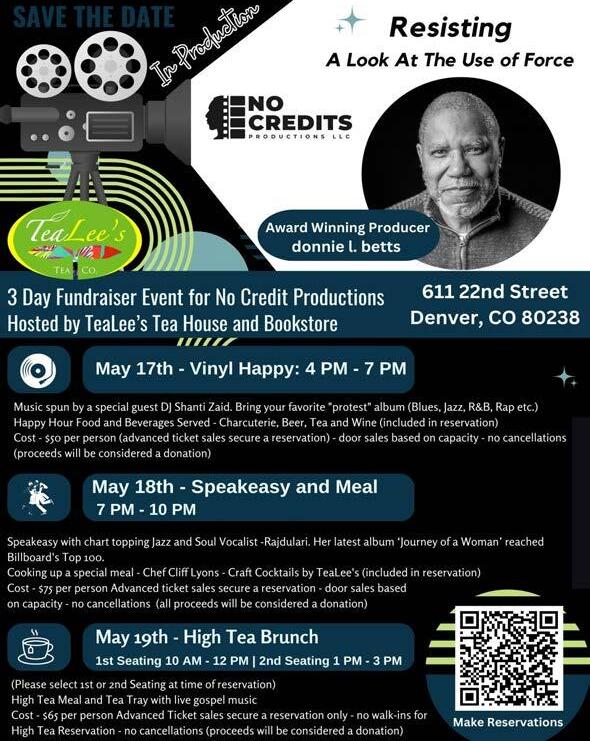







Paying tribute to Dawn Bookhardt, known for her community outreach and legal contributions to Colorado. This month we honor diversity by recognizing the crisis of missing and murdered indigenous people and the challenges faced by Asian, Hawaiian and Pacific Islander communities. Plus, Prince Dykes' book launch highlights financial literacy through real estate.
Denver Urban Spectrum and KGNU Radio present a magazine-style community news radio program that amplifies the voices and stories from people engaged in progressive action work in the metro Denver area and surrounding communities.
X
Stream on denverurbanspectrum.com
—
– May 2024 29
Denver Urban Spectrum
www.denverurbanspectrum.com








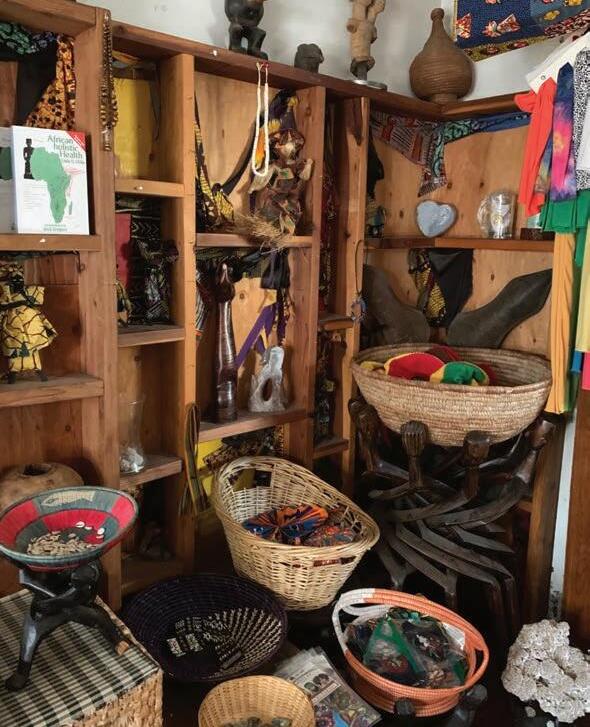

Denver Urban Spectrum — www.denverurbanspectrum.com – May 2024 30 Largestand昀nestselectionof Africangoodsanywhereinthe RockyMountainRegion •Fabrics,ClothingandJewelry•Incense,SheaButter andEssentialOils•PostersandAfricanArt•Skinand HairCareProducts•Teas,Tonics,andHerbalMedicines AKENTEEXPRESS CLOTHINGBO U TI QU E ATouchOfAfrica/Ashanti KingdomCollection DesignsbyDeborah (LocatedUpstairs) 919 ParkAvenueWestDenver,CO80205 303-297-8817-akenteexpress@outlook.com OpenTuesday-Saturday11to7-Mondaybyappointment Eye Sore Scrap Removal Do you have a site for sore eyes that need to be removed? Eye Sore Scrap Removal is here to help. Ready to remove those unwanted appliances? For a quote or to schedule a pickup: Call Lawrence at 303-359-4412 Washers • Dryers • Stoves • Refrigerators • AC Units • Water Heaters • and more 310-491-4633 • candoo13@msn.com

Dear Toni,
Thank you for being an incredible mom! You have enriched so many lives in the community and you have enriched my life as your daughter. Your work as a McDonald’s franchisee and as a Board Member for the Center for African American Health has shown me what it means to be a good steward. Making the decision to join you in the McDonald’s business has been one of the most rewarding experiences of my life.
Thank you for the life you have given me and the example you have set for the mother I want to be. Your love and guidance over the years has set the foundation for the next generation to grow and 昀ourish.
With Love,
匀爀na
Like mother, like daughter, like McDonald’s.















 By Ruby Jones
By Ruby Jones









































 By Ruby Jones
By Ruby Jones









 By Barry Overton
By Barry Overton













































